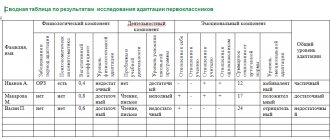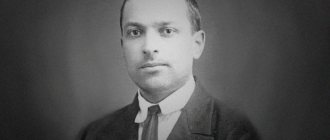Author: Rufina Belkina
A teacher-psychologist at school is a specialist in the field of psychology who studies the mental state of students, corrects their behavior, helps in eliminating personal problems, adapting to a team, helps improve the psychological climate in the classroom, and conducts explanatory work with parents and teachers. By the way, in 2021, the ProfGid career guidance center developed an accurate career guidance test. He himself will tell you which professions are suitable for you, and give an opinion about your personality type and intelligence.
- Courses
Features of the profession
It is believed that the profession of a psychologist becomes part of its carrier over time. The professional uses his skills and knowledge not only in working with patients, but also in everyday life, when communicating with loved ones. After all, the subject of study of a psychologist is the human soul, and it represents an inexhaustible resource for acquiring the necessary knowledge. Psychologists help a person connect his internal resources to solve current psychological problems. The main activities of a psychologist:
- Psychological training, which includes training in methods of emotional self-regulation, the use of special exercises for personal growth and subsequent summing up.
- Consultations involve communication between a specialist and students in order to find the best way out of a difficult situation.
- Testing allows you to study the individual characteristics of the human psyche using interactive programs.
School psychologists are obliged to monitor the psychological health of students, create a comfortable environment for them, and conduct periodic mass examinations in order to identify people requiring psychological help.
Responsibilities
A specialist who wants to take the position of “Teacher-Psychologist” must have a diploma of higher or secondary specialized education in the field of “Pedagogy and Psychology.” The job responsibilities of this profession may vary depending on the chosen field of activity. Below are the main points from the job description:
- Carrying out work to preserve the mental, somatic and social well-being of students in the process of education and training in educational institutions;
- Participation in the protection of rights in accordance with the Convention on the Rights of the Child;
- Conducting an analysis of factors that have a negative impact on the development of the personality of students and pupils, as well as taking measures to provide various types of psychological assistance;
- Drawing up psychological and pedagogical conclusions based on research materials;
- Providing psychological support to creatively gifted children;
- Maintaining documentation in the prescribed form;
- Carrying out work to eliminate problems in personality development;
- Conducting various social and psychological trainings;
- Consulting and providing psychological assistance to employees of institutions;
- Conducting classes on the prevention of social maladjustment.
Pros and cons of the profession
Such specialists play a big role in the lives of students and their parents, because they help to quickly solve various types of problems, preventing dangerous consequences.
Educational psychologists use their knowledge to timely turn current events in the right direction. A child at school is faced with non-childish problems: difficult relationships with peers, lagging behind in studies, misunderstanding of others. If these problems are not solved, the child becomes tense and aggressive. In some cases, suicidal tendencies occur. If the psychologist takes adequate measures, the situation will stabilize.
Pros:
- the opportunity for personal growth, because a specialist is obliged to constantly improve himself;
- acquired professional knowledge helps in everyday life;
- the profession is considered creative and interesting;
- the opportunity to really help people solve their problems;
- knowledge of oneself and the depths of one’s consciousness.
Wage
The average salary of a teacher-psychologist in the Russian Federation is 31,000 rubles. Depending on the region and place of work, this figure may change.
Minimum salary – 15.4 thousand rubles. Maximum monthly earnings are over 100 thousand rubles. and higher.
The average salary by position is presented below:
Supplements may be added to the salary:
- For higher education – 10%.
- For the specifics of the work - 20%.
Important qualities
Psychologists by nature must be altruists, since the emotional difficulties they have to face cannot be compensated for by any money. A high level of responsibility is a key requirement for a true professional.
The main qualities that a psychologist should have:
- emotional and general intelligence must be at a high level;
- the ability to listen and hear a person;
- stress resistance;
- tact and delicacy;
- sociability;
- observation;
- optimism and self-confidence;
- creativity and ability to offer non-standard solutions;
- tolerance;
- ability to calm the client;
- empathy.
A specialist must be able to clearly formulate his thoughts. A sense of humor and endurance will also be very helpful.
Education
The training of relevant specialists is carried out on the basis of the educational program 44.03.02 “Psychological and pedagogical education” .
In order to enroll in this profile, the applicant must pass the following exams:
- Russian language;
- Mathematics (basic level);
- Biology (major subject).
The duration of study in the chosen field of study for full-time study is 4 years (bachelor's degree), and for part-time study - 5 years. If you have secondary vocational education, the period of study at the university will be 3.5 years.
Preparation for the program “Psychological and Pedagogical Education” is carried out with the study of the following areas:
- "Psychology of the individual and group."
- "Formation of pedagogical activity."
- "Developmental Psychology".
- "Psychological support of the pedagogical process."
During the educational process, the student studies both general education disciplines and specialized ones, namely:
- General psychology;
- Psychology of management;
- Psychodiagnostics;
- Individual and social psychology;
- Psychological consultation;
- Age-related psychology;
- Social and psychological trainings;
- Social pedagogy.
- Theory and methodology of training and education;
- Psychology in Commerce and Education;
- Organisation management;
- Personnel Management;
- Conflictology;
- Foreign language.
As can be seen from this list, the student receives not only knowledge in psychological and pedagogical sciences, but also studies management and personnel management, which expands the range of places for employment.
You can obtain a diploma of appropriate education at the following universities in the country:
- Moscow Social Pedagogical Institute (average Unified State Exam score – 56.8, tuition fee 110 thousand rubles per year);
- Moscow City Pedagogical University (average Unified State Exam score – 72.12, tuition fee 199.6 thousand rubles per year);
- Russian State Pedagogical University named after. A.I. Herzen (average Unified State Exam score – 67.07, tuition fee 138.7 thousand rubles per year);
- Russian State Vocational Pedagogical University
- (average Unified State Exam score – 62.5, tuition fee 108 thousand rubles per year);
- Ural State Pedagogical University (average Unified State Exam score – 63.81, tuition fee 108 thousand rubles per year);
- Novosibirsk State Pedagogical University (average Unified State Exam score – 61.73, tuition fee 87 thousand rubles per year);
- Nizhny Novgorod State Pedagogical University named after. Kozma Minin (average Unified State Exam score – 63.10, tuition fee 95.3 thousand rubles per year).
Finally, it should be said that the employment rate of graduates of the profession in question in the country is 79.1%.
Famous psychologists
Dale Carnegie is considered one of the most famous and famous psychologists. He wrote numerous books, essays, articles and lectures. His works are actively used not only by professionals, but also by ordinary citizens who are trying to streamline their lives and understand their own “I”. Lydia Ilyinichna Bozhevich is our compatriot who lived and worked at the beginning of the last century and devoted her life to studying the secrets of the human soul. Having received the knowledge of a professor of psychology, Lydia Ilyinichna continued persistent research in the field of psychology and devoted many works to this topic. Today they are used as teaching aids in many psychological departments.
The list of world celebrities who have devoted their lives to psychology is very extensive and continues to grow. This proves the popularity and relevance of the profession of “psychologist” at all times. After all, the human soul is still a completely unexplored and mysterious object.
Place of work
In modern conditions, specialists in the field of pedagogy and psychology are in demand in the labor market. This profession is becoming widespread in various industries, not counting those where assistance in social adaptation and personality development is the fundamental goal.
Having received a diploma of appropriate education, a qualified specialist can choose one of the following areas of activity:
- Psychological consultation in school and preschool institutions.
- Medical type of psychological consultations.
- Teaching psychology.
- Activities in the HR service.
In accordance with the identified areas of activity, qualified specialists are in demand in:
- Preschool and educational (schools, technical colleges, universities) institutions;
- Medical institutions (rehabilitation centers) and the healthcare sector (children's hospitals, sanatoriums);
- Social services (social protection centers, homeless shelters, etc.) and law enforcement agencies (police, juvenile correctional facilities, etc.);
- At enterprises in any field of human activity, where the work of employees implies the presence of psychological and emotional stress;
- In special units created by the Ministry of Emergency Situations;
- Providing personalized professional services in private offices.
Psychological correction
Once the problem is identified, the behavior correction stage begins. The educational psychologist must prepare a program to correct the existing deviation. The activities of specialists and teachers should be carried out in conjunction with the activities of parents. A positive result of psychological correction will be the complete correction of deviant behavior.
Correction of deviations is carried out individually or within a group. In 1st grade, for example, group correction is practiced, which allows children to get to know each other better and unite into one team. This event is held in the form of a game.
Corrective work is aimed at children who have the following deviations from normal behavior:
- hyperactivity;
- aggression;
- excessive anxiety;
- excessive shyness;
- presence of constant fear;
- attention deficit;
- poor memory;
- difficulties in mastering the material;
- difficult thinking.
If the deviation manifests itself very acutely, cannot be corrected, and at the same time there is a complex failure of the child within the framework of the school curriculum, then the psychologist should raise the question of transferring the student to a specialized educational institution.
Psychological diagnostics
At this stage, the psychologist diagnoses the psychological state of students. Reveals the characteristics of the emotional state, the level of development, and in some cases the degree of social neglect or the presence of mental disorders. Diagnostic testing is carried out in different variations. This could be a test, an event, a group lesson, etc. An educational psychologist processes the information received during the diagnosis and identifies a risk group. Such a group may include children who do not have friends among their peers, students who create conflict situations, and children with weak emotional stability. Any deviation from the norm may be a reason to begin individual work with the child and his parents.
Training
To achieve success in this profession, you need to be willing to constantly learn and improve your skills. Now in public schools, colleges and universities there is a tendency to train employees at public expense. In commercial structures, management also often agrees to pay for retraining courses for a full-time psychologist at the expense of the enterprise. Increasing the level of knowledge of a specific employee brings bonuses to the work process as a whole. Young workers should not be afraid of rejection and should not make suggestions to their superiors.
To unlock the potential
Due to the large and vague list of competencies, a psychologist is often not classified as a teacher, although he is one. It is this specialist who, by monitoring the educational process, can detect the student’s problems in time and help him build an individual plan. “Often a child’s talents are suppressed by focusing on his weaknesses instead of developing his strengths. Parents, wanting to make their child equal to the general mass of children, hire tutors in subjects that are completely uninteresting to the child. “In this way, a huge number of young geniuses were ruined,” says coach psychologist Maria Golosova.










